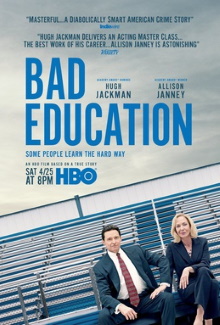This is one of those based on a real story films about events that took place in the early 2000s. In some ways, it’s a fairly straightforward recounting of the story and doesn’t boast of anything especially dazzling. But I rather appreciate how it is clear and informative with only very minimal embellishment of the facts. Also, the film highlights the role of student reporter Rebekah Rombom in breaking the story though her name is changed for the purpose of this film but doesn’t mention that its scriptwriter Mike Makowsky was also a student in the same school during that time.
In 2002, Roslyn High School has risen to become the fourth ranked public school in the US, largely due to the efforts of superintendent Dr. Frank Tassone. This in turns benefits local property prices, making him popular with the school board and parents. He is also beloved by the students as he genuinely tries to help them and has a near-photographic memory for all of the students under his care. However while working on an article about a proposed skywalk for the school, student reporter Rachel Bhargava decides to delve deeper into its finances, encouraged by Tassone himself. She realizes that many of the school’s expenses are billed to non-existent businesses. Meanwhile the complicity of Tassone’s assistant Pam Gluckin is discovered when her son bills construction materials to the school which are then delivered to her home. Tassone successfully convinces the school board to have Gluckin resign but keep the matter quiet. But Bhargava finds out about Tassone’s own participation in the fraud and the fact that he is secretly gay and has a male spouse.
This is a solidly made film, notable mainly in how fascinating the real events it is based on are, and Hugh Jackman’s committed performance as Tassone. Given that this is small film made by a relatively unknown director Cory Finley, it is puzzling that it came to Jackman’s attention at all but it is undeniable that his inclusion elevates it immeasurably. The script does a decent job at laying out multiple events, but if you look at it, the events that reveal Gluckin’s fraud and Tassone’s involvement are not really related. In real life, Gluckin’s embezzlement was discovered by the board two years earlier and kept quiet. Student reporter Rebekah Rombom’s contribution was to find out about this cover-up and break the story in the student newspaper, prompting a wider investigation by the authorities. In the film, it is a little hard to understand why Tassone encouraged her to look deeper when he himself had something to hide. But this seems to have a real life equivalent as Tassone was one of those interviewed by Rombom and the school authorities had an opportunity to kill the story but declined to do so. The real Tassone even really did have a secret younger lover and bought a house for him in Las Vegas even if he was never a student. Overall I am very impressed with the film’s faithfulness to the real facts while still ensuring that it is an engaging piece of entertainment.
One of my favorite things about this film is that even as it establishes Tassone’s guilt without any doubt, it never stops presenting him as a mostly sympathetic character. His drive to raise the school’s standing, and help students, his administrative competence and his political nous in ensuring that the school is well funded are all real. At the same time, he asserts that he ought to be better compensated well for his work as his skills and level of responsibility is equivalent to that of a company’s CEO, yet he is expected to live on a teacher’s salary. This is of course a real tension at the heart of American education at the high school level in which teachers are supposed to be so much more than mere teachers and to embody the values of the community around them, yet are usually placed on the bottom tier in terms of social status and monetary compensation. Yet it is also usually teacher’s unions which block reforms to allow schools to pay high performing teachers and mere ordinary ones differently. Even in Tassone’s case, the film notes that he is still entitled to receive a substantial yearly pension after being convicted due to state laws.
After watching this, I went around looking for more information on the scandal and found surprisingly little. Just about everything you can find on it came out after the release of this film, suggesting that the case wasn’t very widely known before that. Anyway this is a solid, informative film that seems fair to the real people it is based on and says insightful things about the state of American education to boot. Apparently even the real Tassone liked this film.
